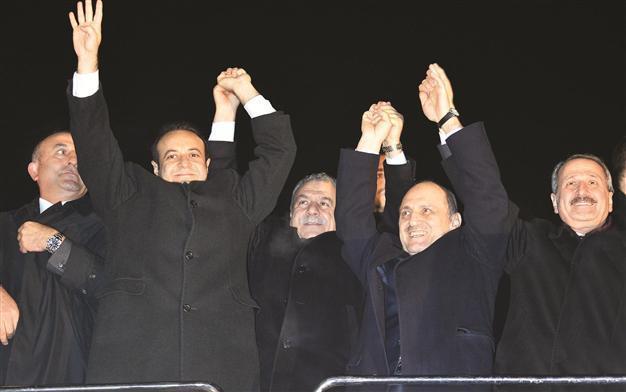Inquiry panel to vote on fate of former ministers
ANKARA

Three of the four four ministers, who were engulfed in a massive corruption operation, Egemen Bağış (L), Muammer Güler (C) and Erdoğan Bayraktar (R), are seen in this picture. Their fate will be decided by an inquiry panel today.
A parliamentary inquiry commission will decide today whether to send four former ministers engulfed in the massive corruption and graft operation that was launched on Dec. 17, 2013, to the Supreme Council for trial.
The commission consists of nine lawmakers from the ruling Justice and Development Party (AKP), four lawmakers from the main opposition Republican People’s Party (CHP) and one lawmaker from the Nationalist Movement Party (MHP), who will vote separately on whether to send former ministers Zafer Çağlayan, Muammer Güler, Egemen Bağış and Erdoğan Bayraktar to the Supreme Council, which is the name the Constitutional Court takes when it tries ministers and senior members of the judiciary.
One member of the commission from the Peoples’ Democratic Party (HDP) withdrew earlier, citing a court’s ban on publishing the testimonies at the panel.
The voting will be open, which means the votes of each member will be made public. The commission will need a majority of the votes to rule in favor of a trial for the former ministers, hence eight votes if all members participate.
The voting is expected to take place today despite an earlier postponement, since the legal term of the inquiry commission expires on Jan. 9.
A separate vote will take place for each of the ministers on which charges they should be sent to the Supreme Council for, should commission members vote in favor of sending the accused ministers to be tried before the Supreme Council. The commission will later submit a report on its probe into the corruption claims to the General Assembly, where a final vote on whether to send each minister to the Council will take place.
Under broad immunity as MPs, they can only be tried at the Supreme Council if Parliament votes for by a majority, which means 276 votes, although the AKP has a clear majority at the General Assembly.
The voting comes amid calls by pro-government media outlets to reject the trial of the former ministers, arguing that the judicial process on the allegations was concluded and further process would equal a “coup attempt.”
The judicial charges against the ministers have already been dropped, on the basis that the evidence in the investigation, including phone recordings and surveillance data, was acquired illegally. The commission remains as the sole active process. On Dec. 17, 2013, Istanbul prosecutors launched the corruption investigation, which also embroiled a number of prominent officials and Reza Zarrab, a businessman of Iranian origin who allegedly paid bribes to ministers for several years.
The ministers are accused of bribery in return for using their political influence to Zarrab’s advantage through various ways. Former Economy Minister Çağlayan is accused of using his influence for Zarrab’s gold exports to Iran and blocking legal and administrative probes into a controversial 1.5 tons of gold traded from Ghana to Dubai via Turkey. Güler is accused of using his ministerial powers to provide security for Zarrab and to grant Turkish citizenship to Zarrab’s relatives through illegal means. Bağış is accused of mediating in Zarrab’s deal to rent a hotel and using his influence for Zarrab’s relatives to obtain visas from European countries. Bayraktar is accused of issuing construction licenses in violation of master plans.
All four ministers testified to the commission.
Former Interior Minister Güler admitted that he gave a reference to Zarrab for a bank in China, but denied allegations that he accepted bribes from him. Lawmakers questioned the increase in Güler’s assets, as well as claims that he used his authority as the interior minister to provide security to Zarrab and help his relatives acquire Turkish citizenship.
Former Economy Minister Çağlayan told the commission that a large bank transaction from Zarrab to his brother - and then subsequently to his own account - was connected to his brother’s debt from the transfer of a company.
Former Environment and Urbanization Minister Bayraktar defended himself against the graft probe allegations that led to his resignation, while also saying the new allegations against him in the inquiry commission were “baseless.”
Former EU Minister Bağış said the wiretap recordings in the corruption case were “montages” made from various speeches.
The government and President Recep Tayyip Erdoğan accuse the Gülen movement of U.S.-based Islamic scholar Fethullah Gülen of organizing a plot to overthrow them, beginning with the Dec. 17, 2013 probes.
The prosecutors who launched the investigation and ordered the detentions on Dec. 17, 2013, were suspended last week by the Supreme Board of Judges and Prosecutors (HSYK), while hundreds of high-ranking police officers have been replaced or suspended since that date. Some ex-police officers have been arrested on charges of illegal wiretapping surveillance.
Ahead of the vote, pro-government papers ran stories yesterday arguing that further action against the former ministers would be nothing more than a “coup attempt plot” by the Gülenists.
In its main story on the front page, daily Sabah claimed that the “real target” was major projects, such as Istanbul’s third bridge over the Bosphorus.
“The parallel state and its supporters not only targeted President Recep Tayyip Erdoğan and Halkbank, but also the companies that build mega projects, such as the third airport and the third bridge,” the Sabah report read. “Now they dream of making these projects controversial, or even stopping them, through the politicized Constitutional Court,” it added.
Similar stories also appeared yesterday on the front pages of the Akşam, Yeni, Şafak and Star newspapers. Daily Akşam recalled some rulings of the Constitutional Court, such as overturning a ban on Twitter, that drew reaction from the ruling AKP, accusing Haşim Kılıç, the head of the top court, of getting involved in politics.
